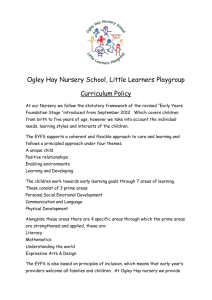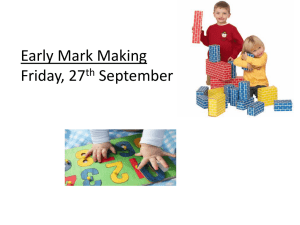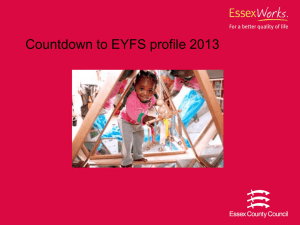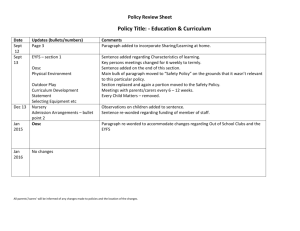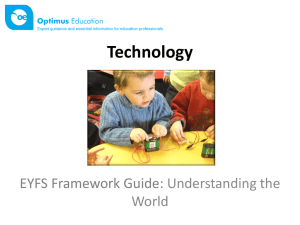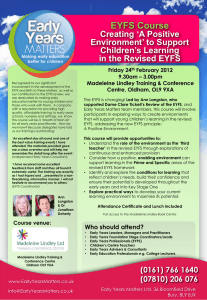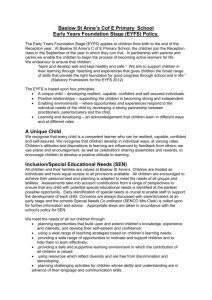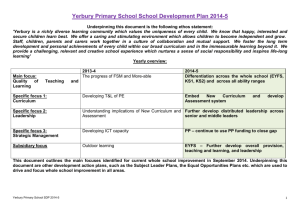Early Years Teaching and Learning Guidance
advertisement
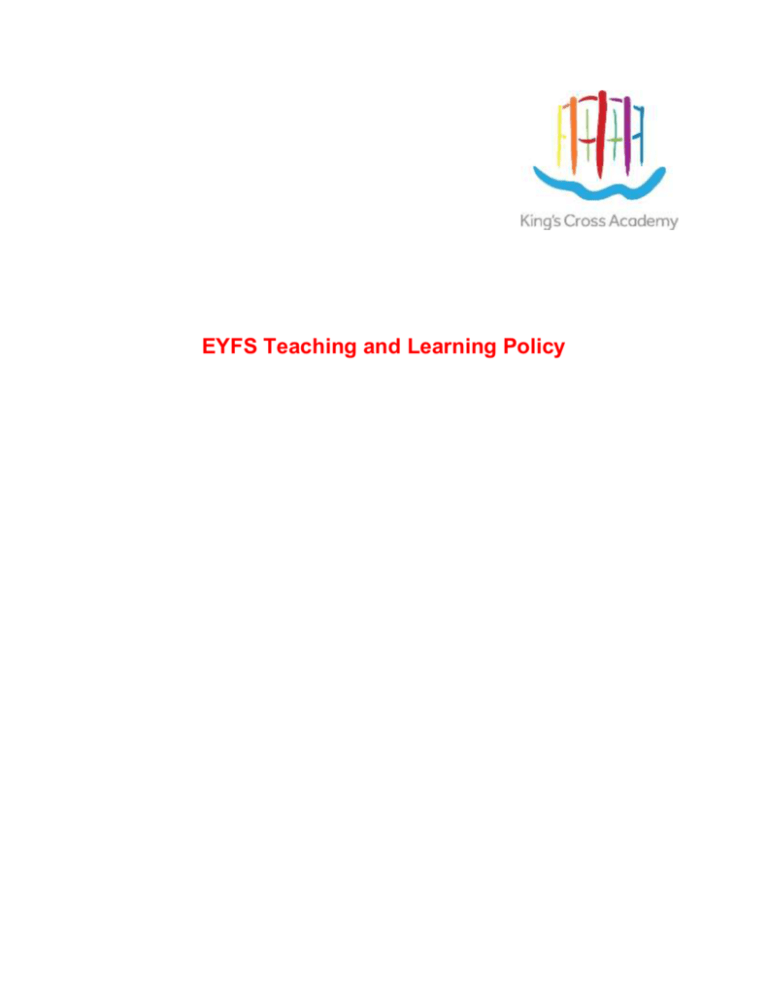
EYFS Teaching and Learning Policy Introduction All of the principles stated in the Academy’s teaching and learning policy apply to the Early Years Foundation Stage (EYFS). We recognise that learning begins at birth and continues throughout life. We acknowledge that everyone has the ability to be a competent learner, regardless of disability or other special needs. Cherishing childhood: We also recognise that the early years are a time where children progress and grow at a rapid rate and where children are bursting with awe and wonder, fun and joy. All the EYFS staff at King’s Cross Academy recognise the special responsibility they hold as custodians of the early years and they do not lose sight of this treasured opportunity. What does highly successful learning look like in Early Years and Foundation Stage (EYFS)? All children follow the Early Years Foundation Stage curriculum. The principles which guide the work of all early years practitioners are grouped into four themes: A Unique Child –Every child is a unique child who is constantly learning and can be resilient, capable, confident and self-assured. Positive Relationships – Children learn to be strong and independent through positive relationships. Enabling Environments – Children learn and develop well in enabling environments, in which their experiences respond to their individual needs and there is a strong partnership between practitioners and parents and carers. Learning and Development – Children develop and learn in different ways. Practitioners teach children by ensuring challenging, playful opportunities across the prime and specific areas of learning and development. They foster the characteristics of effective early learning • Playing and exploring • Active learning • Creating and thinking critically Teaching and Learning Aims That teaching should recognise that early years is a distinctive phase of education requiring specialised teaching to a developmentally appropriate curriculum. To observe, support and extend the individual child’s learning and to recognise that they are entitled to learn at their own pace and in their own way. To enlist Parents as teachers and learners in a partnership approach, for the benefit of all. How to achieve these aims in the Early Years: A focus on the prime areas Prime areas are fundamental, work together, and are move through to support development in all other areas. Personal, Social and Emotional Development Communication and Language Physical development The importance of play: At King’s Cross Academy we acknowledge the central role of play in the education of the young child. Assessment All classes in the EYFS follow the observe, assess and plan cycle: daily, weekly and half termly. Every child has an individual learning story which includes observations and information from both staff and parents that record the child’s journey and progress through the foundation stage. Learning journeys contain: 1. 2. 3. 4. 5. Long Observations Short Observations A ‘special book’ with pieces of work and photographs Comments from children and families Termly reviews, assessments and next steps. They form an essential evidence base for planning children’s next steps and sharing learning with families (more detail of EYFS assessment procedures can be found in the Academy Teaching and Learning Policy) Planning: Planning takes place mid termly, weekly and daily and takes account of information from observation and information from parents. This may include children’s interests preferred ways of working, and identified schematic behaviour. Evaluation: Monitoring and evaluation form the basis of informed planning. Verbal or written evaluations take place constantly and planning is flexible to take account of this information. The important role of all adults: We recognise the importance of the role that all early years educators play in the care and education of our youngest children. These roles include: Building relationships. Getting to know all of our children and families Key working small groups of children Observing children to identify their wellbeing and involvement, their needs , strengths , schemas and interests Planning for next steps in learning Supporting and extending child initiated activity Engaging children in focussed activity Maintaining and developing a stimulating, welcoming safe and challenging learning environment Working as a team to ensure that all children reach their full potential The Learning environment: At King’s Cross Academy we recognise the importance of providing a stimulating, interesting, welcoming, safe and challenging learning environment. All rooms are organised and resourced to provide learning opportunities in the seven areas of learning in the EYFS curriculum. Children are taught how to access the equipment in each area of provision independently from the moment they are able, to enable them to follow their own ideas and interests. There is a high level of staff involvement in children's chosen activities and play. There are also planned age appropriate ‘focused activities' for specific children, or groups of children providing a balance of child and adult initiated activity. Suitably differentiated activities are organised to meet the learning needs of each child. There is some whole class teaching for short periods of time for nursery children such as shared story. Where possible these times happen at the end of a session of free flow play. In the reception classes, whole class carpet times happen at the beginning and end of each session both morning and afternoon to ensure that children have access to daily phonics sessions, mathematics, and story and shared writing. Outdoor Provision All children in the EYFS have access to the outdoor learning environment for the majority of each session. The outdoor learning environment is valued as half of the curriculum and is organised into areas of provision that promote the seven areas of learning in the EYFS curriculum. (See outdoor play policy). Partnership with Parents At King’s Cross Academy we recognise the importance of parents as children’s first educators and the important role the home learning environment plays in the development and education of the young child. We develop our partnership through: Home visits Key persons systems Parent and family music sessions Regular parent workshops focussed on learning in the EYFS Regular parents meetings Whole school and centre celebrations Daily opportunities to talk to your key person about your child’s learning and development We regularly monitor our provision to ensure every child's learning is well supported and builds on children's own home, cultural and linguistic backgrounds. We use materials, equipment and displays which reflect the home languages, cultural and ethnic diversity of the children, the local community and wider world. We work towards supporting bilingual children's development in their home language as well as English. We ensure that bilingual children have access to the full curriculum and are involved in all the learning experiences offered giving the extra support needed so that they can participate and understand. Children will be learning English through real life, every day, meaningful experiences and through interacting with other children and staff. Document Control Written by Ratified by Governors Date for Review Signed – Chair of Governors Signed – Headteacher September 2015
